Research Report: Aims, Objectives, and Methodology in Obesity Study
VerifiedAdded on 2023/01/20
|9
|3022
|20
Report
AI Summary
This report details a research study focused on obesity, aiming to provide an evidence-based intervention to eradicate the condition. The research presents a qualitative synthesis of health-based promotions on obesity, with objectives including increasing awareness, improving access to weight management information, developing training programs for health professionals, and creating informative websites. The methodology involves a data extraction table from at least 25 research papers, analyzing the type of research, year of publication, authors, context, and conclusions. The report includes a detailed analysis of various studies, examining the prevalence of obesity, its health and economic burdens, and related factors such as unhealthy eating practices, psychological consequences, and community food environments. The findings underscore the importance of continued surveillance, interventions tailored to geographical regions, and the need for a multidisciplinary approach to address the complex challenges of obesity.
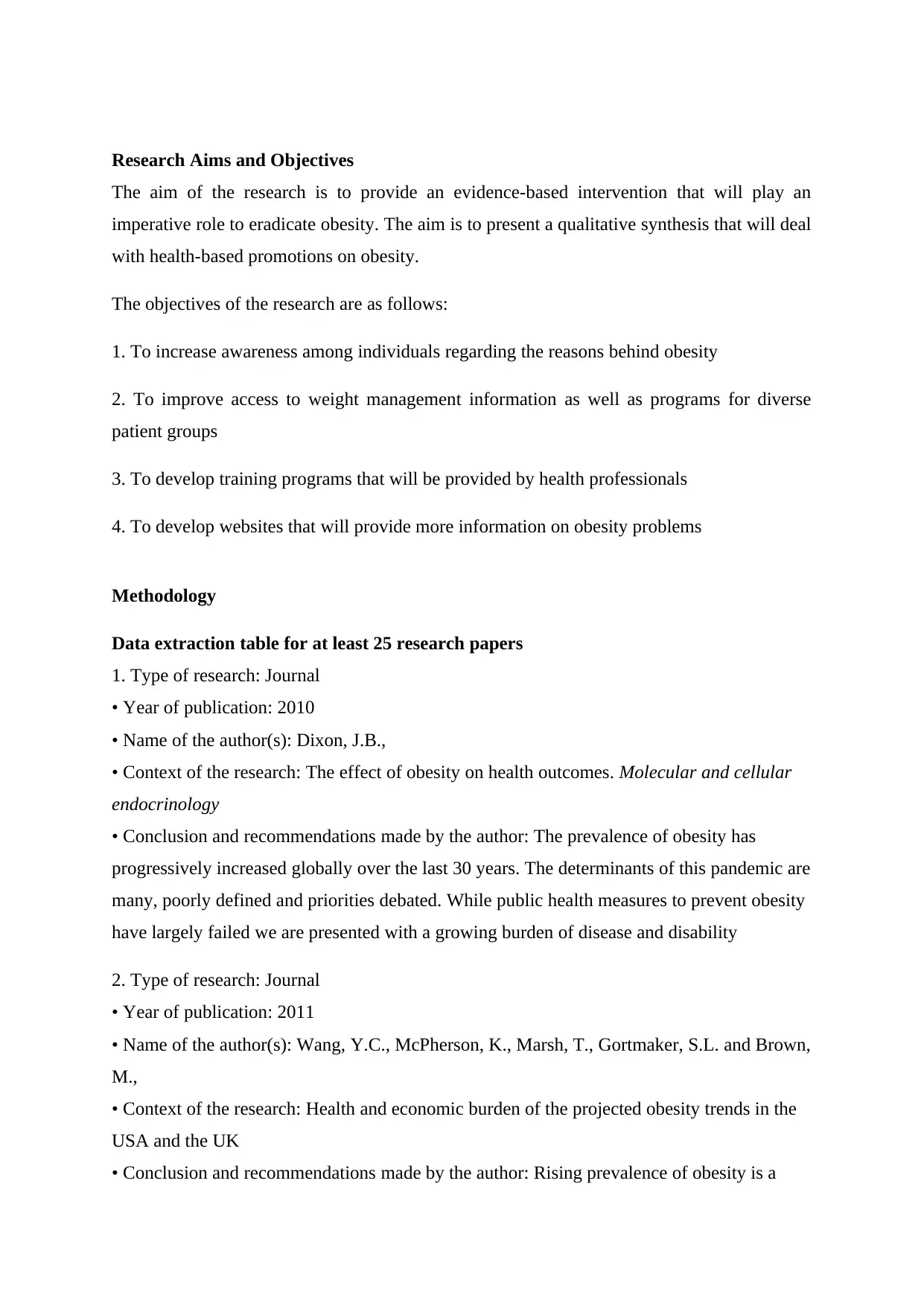
Research Aims and Objectives
The aim of the research is to provide an evidence-based intervention that will play an
imperative role to eradicate obesity. The aim is to present a qualitative synthesis that will deal
with health-based promotions on obesity.
The objectives of the research are as follows:
1. To increase awareness among individuals regarding the reasons behind obesity
2. To improve access to weight management information as well as programs for diverse
patient groups
3. To develop training programs that will be provided by health professionals
4. To develop websites that will provide more information on obesity problems
Methodology
Data extraction table for at least 25 research papers
1. Type of research: Journal
• Year of publication: 2010
• Name of the author(s): Dixon, J.B.,
• Context of the research: The effect of obesity on health outcomes. Molecular and cellular
endocrinology
• Conclusion and recommendations made by the author: The prevalence of obesity has
progressively increased globally over the last 30 years. The determinants of this pandemic are
many, poorly defined and priorities debated. While public health measures to prevent obesity
have largely failed we are presented with a growing burden of disease and disability
2. Type of research: Journal
• Year of publication: 2011
• Name of the author(s): Wang, Y.C., McPherson, K., Marsh, T., Gortmaker, S.L. and Brown,
M.,
• Context of the research: Health and economic burden of the projected obesity trends in the
USA and the UK
• Conclusion and recommendations made by the author: Rising prevalence of obesity is a
The aim of the research is to provide an evidence-based intervention that will play an
imperative role to eradicate obesity. The aim is to present a qualitative synthesis that will deal
with health-based promotions on obesity.
The objectives of the research are as follows:
1. To increase awareness among individuals regarding the reasons behind obesity
2. To improve access to weight management information as well as programs for diverse
patient groups
3. To develop training programs that will be provided by health professionals
4. To develop websites that will provide more information on obesity problems
Methodology
Data extraction table for at least 25 research papers
1. Type of research: Journal
• Year of publication: 2010
• Name of the author(s): Dixon, J.B.,
• Context of the research: The effect of obesity on health outcomes. Molecular and cellular
endocrinology
• Conclusion and recommendations made by the author: The prevalence of obesity has
progressively increased globally over the last 30 years. The determinants of this pandemic are
many, poorly defined and priorities debated. While public health measures to prevent obesity
have largely failed we are presented with a growing burden of disease and disability
2. Type of research: Journal
• Year of publication: 2011
• Name of the author(s): Wang, Y.C., McPherson, K., Marsh, T., Gortmaker, S.L. and Brown,
M.,
• Context of the research: Health and economic burden of the projected obesity trends in the
USA and the UK
• Conclusion and recommendations made by the author: Rising prevalence of obesity is a
Secure Best Marks with AI Grader
Need help grading? Try our AI Grader for instant feedback on your assignments.
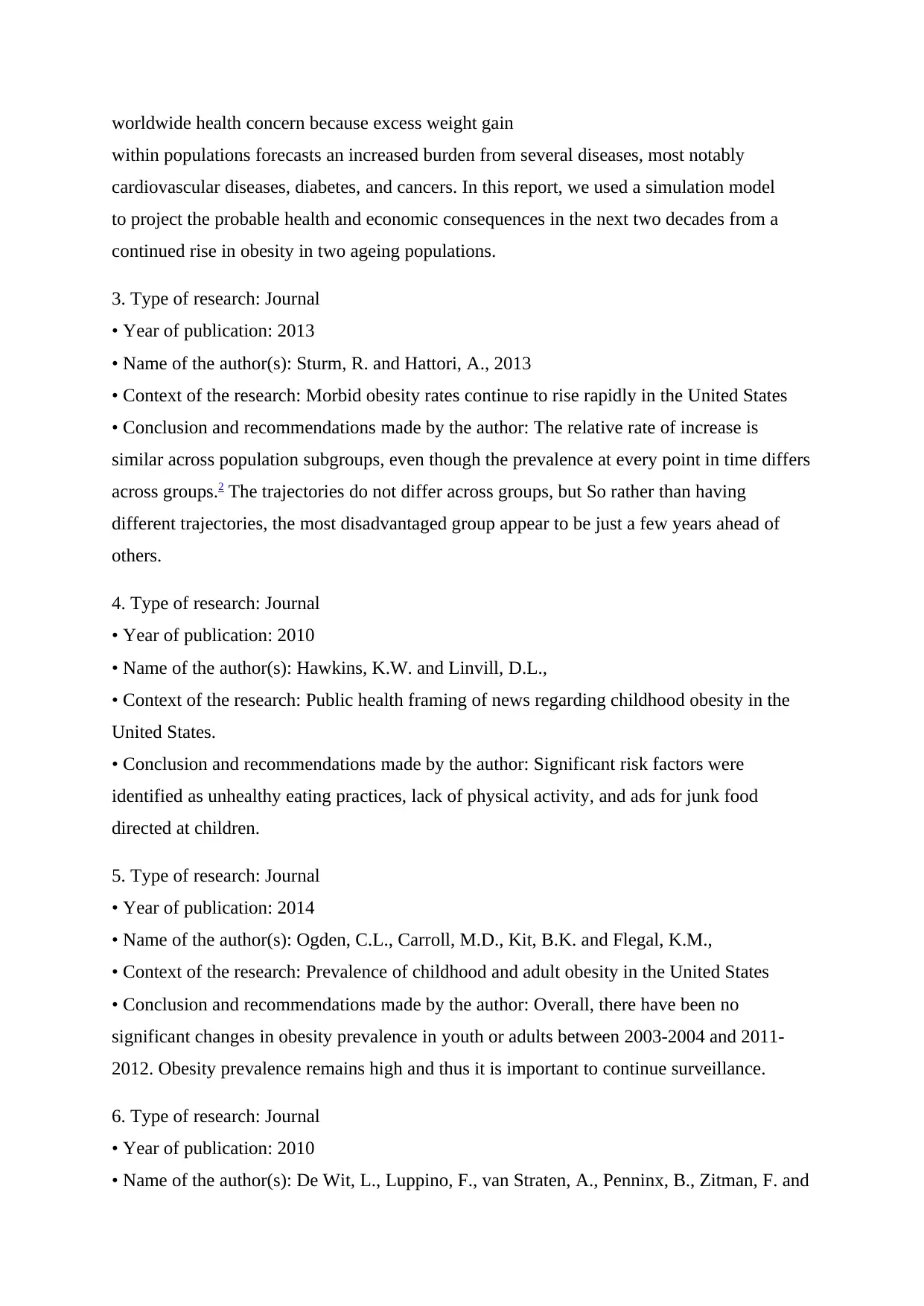
worldwide health concern because excess weight gain
within populations forecasts an increased burden from several diseases, most notably
cardiovascular diseases, diabetes, and cancers. In this report, we used a simulation model
to project the probable health and economic consequences in the next two decades from a
continued rise in obesity in two ageing populations.
3. Type of research: Journal
• Year of publication: 2013
• Name of the author(s): Sturm, R. and Hattori, A., 2013
• Context of the research: Morbid obesity rates continue to rise rapidly in the United States
• Conclusion and recommendations made by the author: The relative rate of increase is
similar across population subgroups, even though the prevalence at every point in time differs
across groups.2 The trajectories do not differ across groups, but So rather than having
different trajectories, the most disadvantaged group appear to be just a few years ahead of
others.
4. Type of research: Journal
• Year of publication: 2010
• Name of the author(s): Hawkins, K.W. and Linvill, D.L.,
• Context of the research: Public health framing of news regarding childhood obesity in the
United States.
• Conclusion and recommendations made by the author: Significant risk factors were
identified as unhealthy eating practices, lack of physical activity, and ads for junk food
directed at children.
5. Type of research: Journal
• Year of publication: 2014
• Name of the author(s): Ogden, C.L., Carroll, M.D., Kit, B.K. and Flegal, K.M.,
• Context of the research: Prevalence of childhood and adult obesity in the United States
• Conclusion and recommendations made by the author: Overall, there have been no
significant changes in obesity prevalence in youth or adults between 2003-2004 and 2011-
2012. Obesity prevalence remains high and thus it is important to continue surveillance.
6. Type of research: Journal
• Year of publication: 2010
• Name of the author(s): De Wit, L., Luppino, F., van Straten, A., Penninx, B., Zitman, F. and
within populations forecasts an increased burden from several diseases, most notably
cardiovascular diseases, diabetes, and cancers. In this report, we used a simulation model
to project the probable health and economic consequences in the next two decades from a
continued rise in obesity in two ageing populations.
3. Type of research: Journal
• Year of publication: 2013
• Name of the author(s): Sturm, R. and Hattori, A., 2013
• Context of the research: Morbid obesity rates continue to rise rapidly in the United States
• Conclusion and recommendations made by the author: The relative rate of increase is
similar across population subgroups, even though the prevalence at every point in time differs
across groups.2 The trajectories do not differ across groups, but So rather than having
different trajectories, the most disadvantaged group appear to be just a few years ahead of
others.
4. Type of research: Journal
• Year of publication: 2010
• Name of the author(s): Hawkins, K.W. and Linvill, D.L.,
• Context of the research: Public health framing of news regarding childhood obesity in the
United States.
• Conclusion and recommendations made by the author: Significant risk factors were
identified as unhealthy eating practices, lack of physical activity, and ads for junk food
directed at children.
5. Type of research: Journal
• Year of publication: 2014
• Name of the author(s): Ogden, C.L., Carroll, M.D., Kit, B.K. and Flegal, K.M.,
• Context of the research: Prevalence of childhood and adult obesity in the United States
• Conclusion and recommendations made by the author: Overall, there have been no
significant changes in obesity prevalence in youth or adults between 2003-2004 and 2011-
2012. Obesity prevalence remains high and thus it is important to continue surveillance.
6. Type of research: Journal
• Year of publication: 2010
• Name of the author(s): De Wit, L., Luppino, F., van Straten, A., Penninx, B., Zitman, F. and
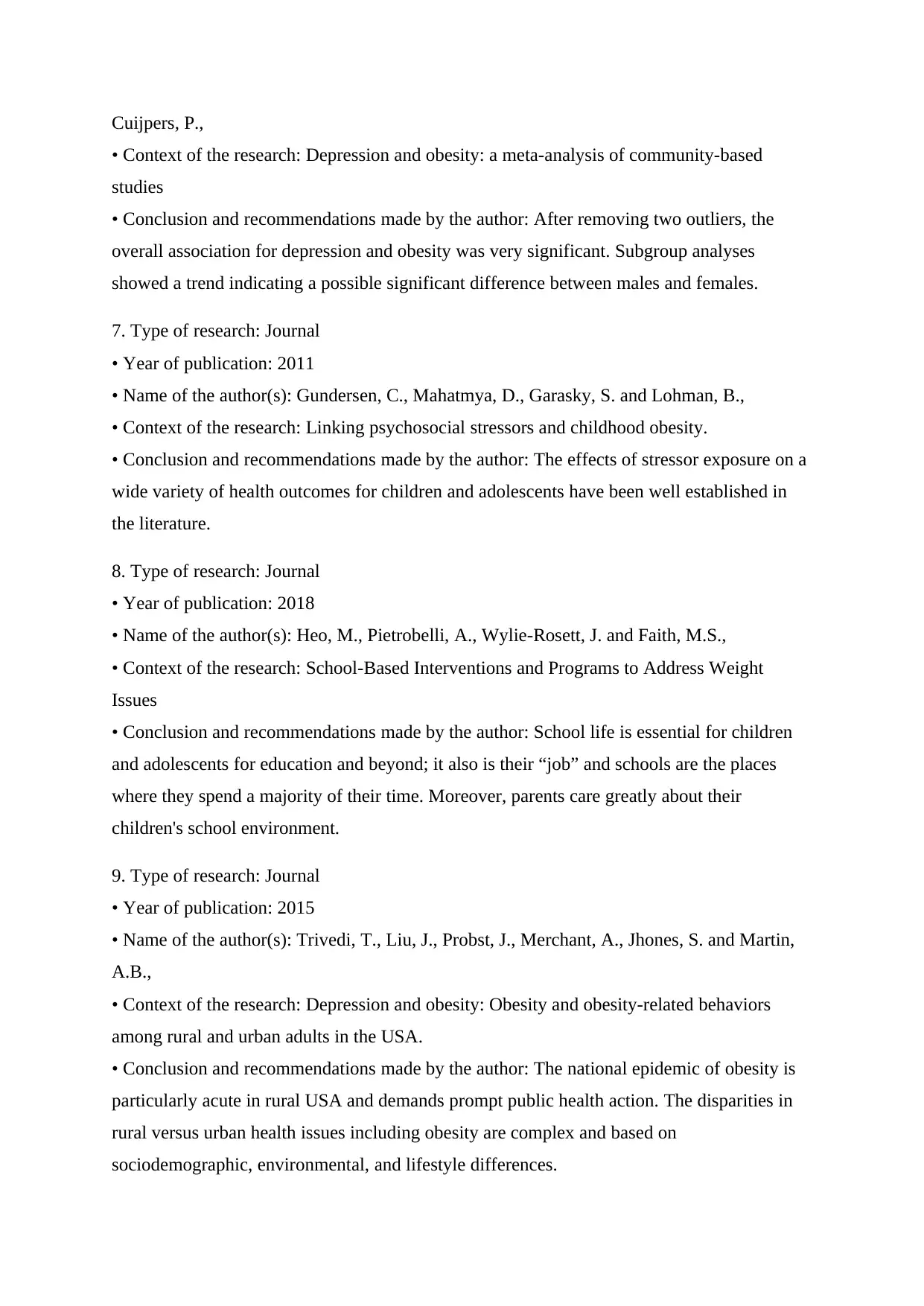
Cuijpers, P.,
• Context of the research: Depression and obesity: a meta-analysis of community-based
studies
• Conclusion and recommendations made by the author: After removing two outliers, the
overall association for depression and obesity was very significant. Subgroup analyses
showed a trend indicating a possible significant difference between males and females.
7. Type of research: Journal
• Year of publication: 2011
• Name of the author(s): Gundersen, C., Mahatmya, D., Garasky, S. and Lohman, B.,
• Context of the research: Linking psychosocial stressors and childhood obesity.
• Conclusion and recommendations made by the author: The effects of stressor exposure on a
wide variety of health outcomes for children and adolescents have been well established in
the literature.
8. Type of research: Journal
• Year of publication: 2018
• Name of the author(s): Heo, M., Pietrobelli, A., Wylie-Rosett, J. and Faith, M.S.,
• Context of the research: School-Based Interventions and Programs to Address Weight
Issues
• Conclusion and recommendations made by the author: School life is essential for children
and adolescents for education and beyond; it also is their “job” and schools are the places
where they spend a majority of their time. Moreover, parents care greatly about their
children's school environment.
9. Type of research: Journal
• Year of publication: 2015
• Name of the author(s): Trivedi, T., Liu, J., Probst, J., Merchant, A., Jhones, S. and Martin,
A.B.,
• Context of the research: Depression and obesity: Obesity and obesity-related behaviors
among rural and urban adults in the USA.
• Conclusion and recommendations made by the author: The national epidemic of obesity is
particularly acute in rural USA and demands prompt public health action. The disparities in
rural versus urban health issues including obesity are complex and based on
sociodemographic, environmental, and lifestyle differences.
• Context of the research: Depression and obesity: a meta-analysis of community-based
studies
• Conclusion and recommendations made by the author: After removing two outliers, the
overall association for depression and obesity was very significant. Subgroup analyses
showed a trend indicating a possible significant difference between males and females.
7. Type of research: Journal
• Year of publication: 2011
• Name of the author(s): Gundersen, C., Mahatmya, D., Garasky, S. and Lohman, B.,
• Context of the research: Linking psychosocial stressors and childhood obesity.
• Conclusion and recommendations made by the author: The effects of stressor exposure on a
wide variety of health outcomes for children and adolescents have been well established in
the literature.
8. Type of research: Journal
• Year of publication: 2018
• Name of the author(s): Heo, M., Pietrobelli, A., Wylie-Rosett, J. and Faith, M.S.,
• Context of the research: School-Based Interventions and Programs to Address Weight
Issues
• Conclusion and recommendations made by the author: School life is essential for children
and adolescents for education and beyond; it also is their “job” and schools are the places
where they spend a majority of their time. Moreover, parents care greatly about their
children's school environment.
9. Type of research: Journal
• Year of publication: 2015
• Name of the author(s): Trivedi, T., Liu, J., Probst, J., Merchant, A., Jhones, S. and Martin,
A.B.,
• Context of the research: Depression and obesity: Obesity and obesity-related behaviors
among rural and urban adults in the USA.
• Conclusion and recommendations made by the author: The national epidemic of obesity is
particularly acute in rural USA and demands prompt public health action. The disparities in
rural versus urban health issues including obesity are complex and based on
sociodemographic, environmental, and lifestyle differences.
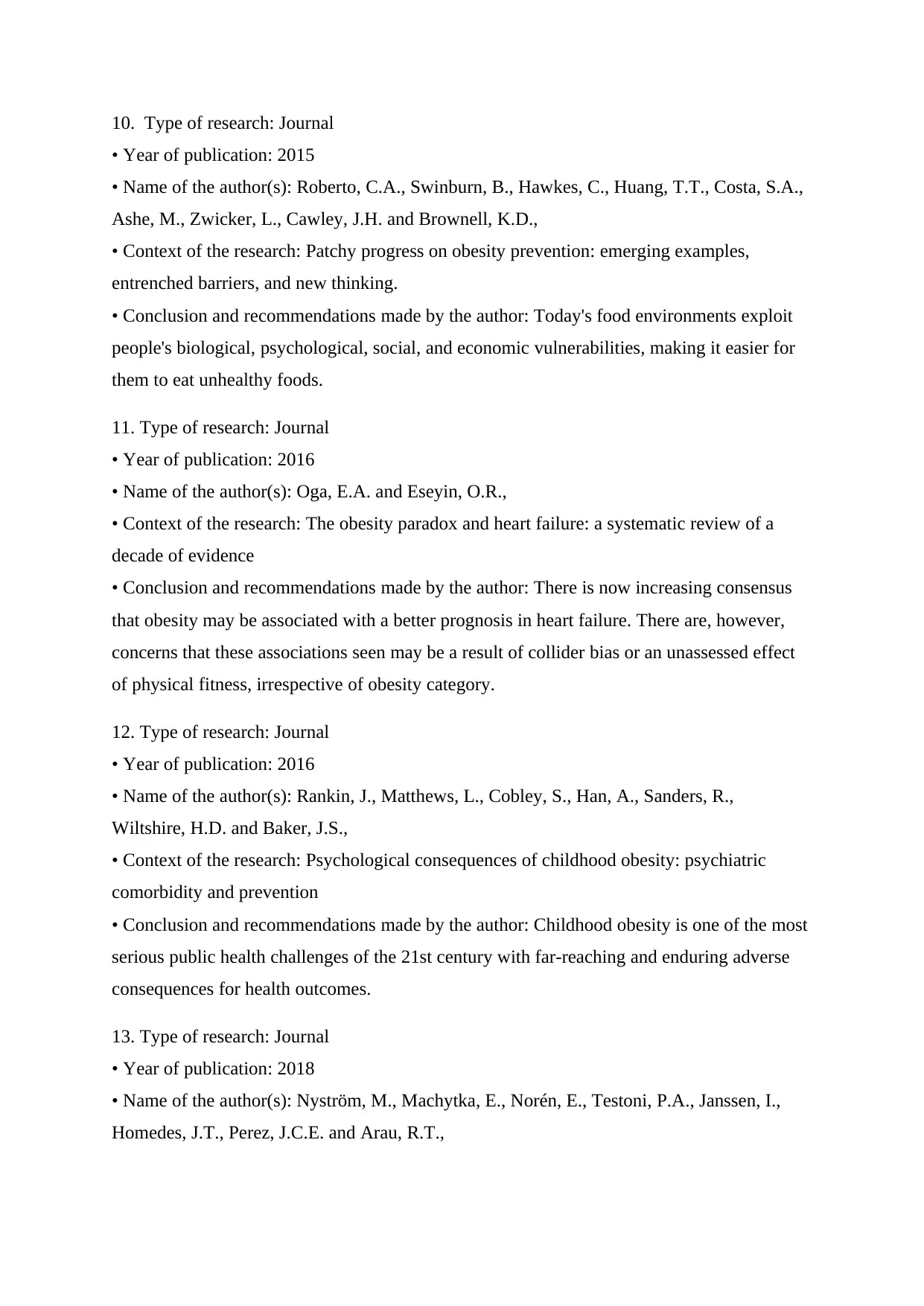
10. Type of research: Journal
• Year of publication: 2015
• Name of the author(s): Roberto, C.A., Swinburn, B., Hawkes, C., Huang, T.T., Costa, S.A.,
Ashe, M., Zwicker, L., Cawley, J.H. and Brownell, K.D.,
• Context of the research: Patchy progress on obesity prevention: emerging examples,
entrenched barriers, and new thinking.
• Conclusion and recommendations made by the author: Today's food environments exploit
people's biological, psychological, social, and economic vulnerabilities, making it easier for
them to eat unhealthy foods.
11. Type of research: Journal
• Year of publication: 2016
• Name of the author(s): Oga, E.A. and Eseyin, O.R.,
• Context of the research: The obesity paradox and heart failure: a systematic review of a
decade of evidence
• Conclusion and recommendations made by the author: There is now increasing consensus
that obesity may be associated with a better prognosis in heart failure. There are, however,
concerns that these associations seen may be a result of collider bias or an unassessed effect
of physical fitness, irrespective of obesity category.
12. Type of research: Journal
• Year of publication: 2016
• Name of the author(s): Rankin, J., Matthews, L., Cobley, S., Han, A., Sanders, R.,
Wiltshire, H.D. and Baker, J.S.,
• Context of the research: Psychological consequences of childhood obesity: psychiatric
comorbidity and prevention
• Conclusion and recommendations made by the author: Childhood obesity is one of the most
serious public health challenges of the 21st century with far-reaching and enduring adverse
consequences for health outcomes.
13. Type of research: Journal
• Year of publication: 2018
• Name of the author(s): Nyström, M., Machytka, E., Norén, E., Testoni, P.A., Janssen, I.,
Homedes, J.T., Perez, J.C.E. and Arau, R.T.,
• Year of publication: 2015
• Name of the author(s): Roberto, C.A., Swinburn, B., Hawkes, C., Huang, T.T., Costa, S.A.,
Ashe, M., Zwicker, L., Cawley, J.H. and Brownell, K.D.,
• Context of the research: Patchy progress on obesity prevention: emerging examples,
entrenched barriers, and new thinking.
• Conclusion and recommendations made by the author: Today's food environments exploit
people's biological, psychological, social, and economic vulnerabilities, making it easier for
them to eat unhealthy foods.
11. Type of research: Journal
• Year of publication: 2016
• Name of the author(s): Oga, E.A. and Eseyin, O.R.,
• Context of the research: The obesity paradox and heart failure: a systematic review of a
decade of evidence
• Conclusion and recommendations made by the author: There is now increasing consensus
that obesity may be associated with a better prognosis in heart failure. There are, however,
concerns that these associations seen may be a result of collider bias or an unassessed effect
of physical fitness, irrespective of obesity category.
12. Type of research: Journal
• Year of publication: 2016
• Name of the author(s): Rankin, J., Matthews, L., Cobley, S., Han, A., Sanders, R.,
Wiltshire, H.D. and Baker, J.S.,
• Context of the research: Psychological consequences of childhood obesity: psychiatric
comorbidity and prevention
• Conclusion and recommendations made by the author: Childhood obesity is one of the most
serious public health challenges of the 21st century with far-reaching and enduring adverse
consequences for health outcomes.
13. Type of research: Journal
• Year of publication: 2018
• Name of the author(s): Nyström, M., Machytka, E., Norén, E., Testoni, P.A., Janssen, I.,
Homedes, J.T., Perez, J.C.E. and Arau, R.T.,
Secure Best Marks with AI Grader
Need help grading? Try our AI Grader for instant feedback on your assignments.
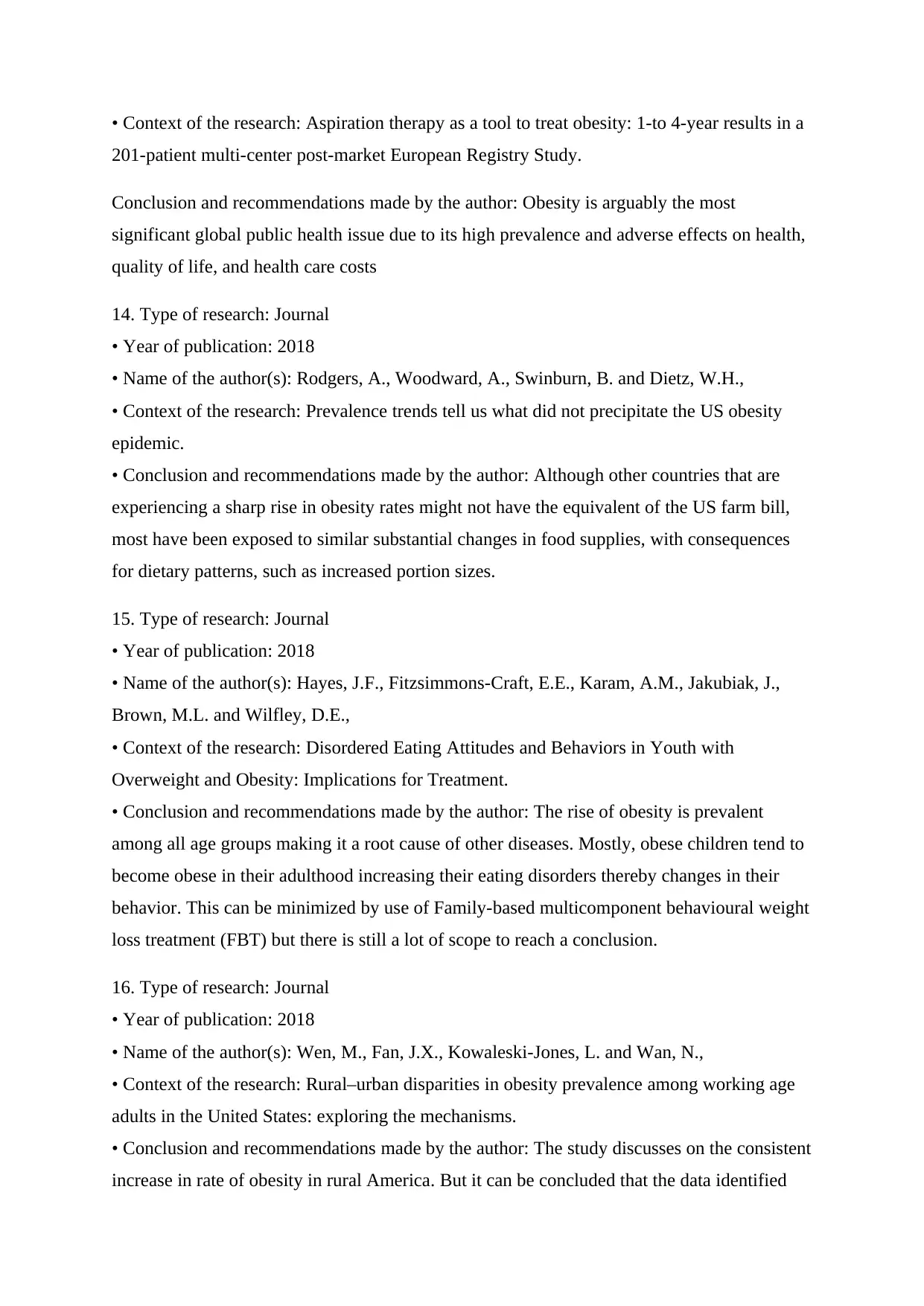
• Context of the research: Aspiration therapy as a tool to treat obesity: 1-to 4-year results in a
201-patient multi-center post-market European Registry Study.
Conclusion and recommendations made by the author: Obesity is arguably the most
significant global public health issue due to its high prevalence and adverse effects on health,
quality of life, and health care costs
14. Type of research: Journal
• Year of publication: 2018
• Name of the author(s): Rodgers, A., Woodward, A., Swinburn, B. and Dietz, W.H.,
• Context of the research: Prevalence trends tell us what did not precipitate the US obesity
epidemic.
• Conclusion and recommendations made by the author: Although other countries that are
experiencing a sharp rise in obesity rates might not have the equivalent of the US farm bill,
most have been exposed to similar substantial changes in food supplies, with consequences
for dietary patterns, such as increased portion sizes.
15. Type of research: Journal
• Year of publication: 2018
• Name of the author(s): Hayes, J.F., Fitzsimmons-Craft, E.E., Karam, A.M., Jakubiak, J.,
Brown, M.L. and Wilfley, D.E.,
• Context of the research: Disordered Eating Attitudes and Behaviors in Youth with
Overweight and Obesity: Implications for Treatment.
• Conclusion and recommendations made by the author: The rise of obesity is prevalent
among all age groups making it a root cause of other diseases. Mostly, obese children tend to
become obese in their adulthood increasing their eating disorders thereby changes in their
behavior. This can be minimized by use of Family-based multicomponent behavioural weight
loss treatment (FBT) but there is still a lot of scope to reach a conclusion.
16. Type of research: Journal
• Year of publication: 2018
• Name of the author(s): Wen, M., Fan, J.X., Kowaleski-Jones, L. and Wan, N.,
• Context of the research: Rural–urban disparities in obesity prevalence among working age
adults in the United States: exploring the mechanisms.
• Conclusion and recommendations made by the author: The study discusses on the consistent
increase in rate of obesity in rural America. But it can be concluded that the data identified
201-patient multi-center post-market European Registry Study.
Conclusion and recommendations made by the author: Obesity is arguably the most
significant global public health issue due to its high prevalence and adverse effects on health,
quality of life, and health care costs
14. Type of research: Journal
• Year of publication: 2018
• Name of the author(s): Rodgers, A., Woodward, A., Swinburn, B. and Dietz, W.H.,
• Context of the research: Prevalence trends tell us what did not precipitate the US obesity
epidemic.
• Conclusion and recommendations made by the author: Although other countries that are
experiencing a sharp rise in obesity rates might not have the equivalent of the US farm bill,
most have been exposed to similar substantial changes in food supplies, with consequences
for dietary patterns, such as increased portion sizes.
15. Type of research: Journal
• Year of publication: 2018
• Name of the author(s): Hayes, J.F., Fitzsimmons-Craft, E.E., Karam, A.M., Jakubiak, J.,
Brown, M.L. and Wilfley, D.E.,
• Context of the research: Disordered Eating Attitudes and Behaviors in Youth with
Overweight and Obesity: Implications for Treatment.
• Conclusion and recommendations made by the author: The rise of obesity is prevalent
among all age groups making it a root cause of other diseases. Mostly, obese children tend to
become obese in their adulthood increasing their eating disorders thereby changes in their
behavior. This can be minimized by use of Family-based multicomponent behavioural weight
loss treatment (FBT) but there is still a lot of scope to reach a conclusion.
16. Type of research: Journal
• Year of publication: 2018
• Name of the author(s): Wen, M., Fan, J.X., Kowaleski-Jones, L. and Wan, N.,
• Context of the research: Rural–urban disparities in obesity prevalence among working age
adults in the United States: exploring the mechanisms.
• Conclusion and recommendations made by the author: The study discusses on the consistent
increase in rate of obesity in rural America. But it can be concluded that the data identified
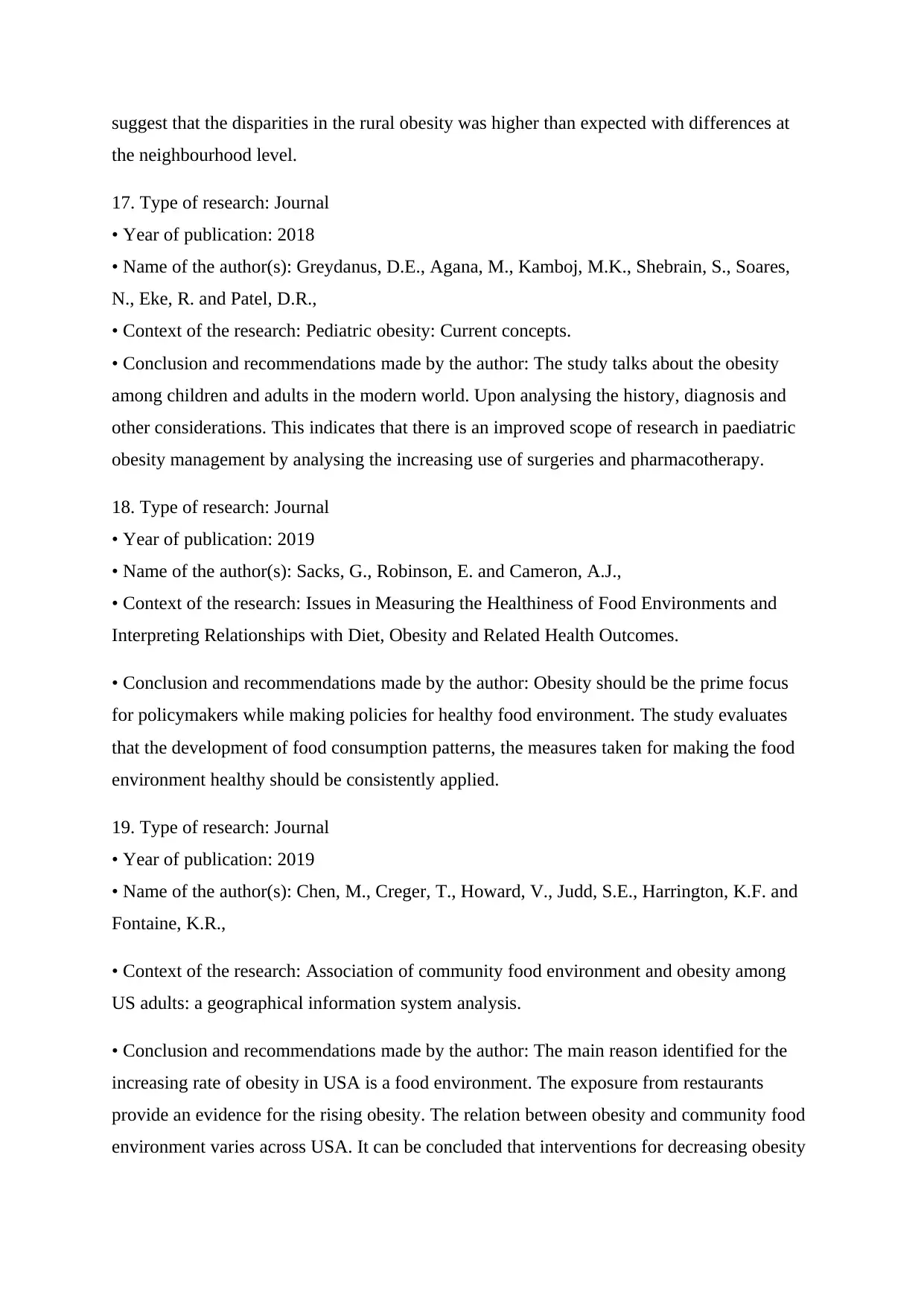
suggest that the disparities in the rural obesity was higher than expected with differences at
the neighbourhood level.
17. Type of research: Journal
• Year of publication: 2018
• Name of the author(s): Greydanus, D.E., Agana, M., Kamboj, M.K., Shebrain, S., Soares,
N., Eke, R. and Patel, D.R.,
• Context of the research: Pediatric obesity: Current concepts.
• Conclusion and recommendations made by the author: The study talks about the obesity
among children and adults in the modern world. Upon analysing the history, diagnosis and
other considerations. This indicates that there is an improved scope of research in paediatric
obesity management by analysing the increasing use of surgeries and pharmacotherapy.
18. Type of research: Journal
• Year of publication: 2019
• Name of the author(s): Sacks, G., Robinson, E. and Cameron, A.J.,
• Context of the research: Issues in Measuring the Healthiness of Food Environments and
Interpreting Relationships with Diet, Obesity and Related Health Outcomes.
• Conclusion and recommendations made by the author: Obesity should be the prime focus
for policymakers while making policies for healthy food environment. The study evaluates
that the development of food consumption patterns, the measures taken for making the food
environment healthy should be consistently applied.
19. Type of research: Journal
• Year of publication: 2019
• Name of the author(s): Chen, M., Creger, T., Howard, V., Judd, S.E., Harrington, K.F. and
Fontaine, K.R.,
• Context of the research: Association of community food environment and obesity among
US adults: a geographical information system analysis.
• Conclusion and recommendations made by the author: The main reason identified for the
increasing rate of obesity in USA is a food environment. The exposure from restaurants
provide an evidence for the rising obesity. The relation between obesity and community food
environment varies across USA. It can be concluded that interventions for decreasing obesity
the neighbourhood level.
17. Type of research: Journal
• Year of publication: 2018
• Name of the author(s): Greydanus, D.E., Agana, M., Kamboj, M.K., Shebrain, S., Soares,
N., Eke, R. and Patel, D.R.,
• Context of the research: Pediatric obesity: Current concepts.
• Conclusion and recommendations made by the author: The study talks about the obesity
among children and adults in the modern world. Upon analysing the history, diagnosis and
other considerations. This indicates that there is an improved scope of research in paediatric
obesity management by analysing the increasing use of surgeries and pharmacotherapy.
18. Type of research: Journal
• Year of publication: 2019
• Name of the author(s): Sacks, G., Robinson, E. and Cameron, A.J.,
• Context of the research: Issues in Measuring the Healthiness of Food Environments and
Interpreting Relationships with Diet, Obesity and Related Health Outcomes.
• Conclusion and recommendations made by the author: Obesity should be the prime focus
for policymakers while making policies for healthy food environment. The study evaluates
that the development of food consumption patterns, the measures taken for making the food
environment healthy should be consistently applied.
19. Type of research: Journal
• Year of publication: 2019
• Name of the author(s): Chen, M., Creger, T., Howard, V., Judd, S.E., Harrington, K.F. and
Fontaine, K.R.,
• Context of the research: Association of community food environment and obesity among
US adults: a geographical information system analysis.
• Conclusion and recommendations made by the author: The main reason identified for the
increasing rate of obesity in USA is a food environment. The exposure from restaurants
provide an evidence for the rising obesity. The relation between obesity and community food
environment varies across USA. It can be concluded that interventions for decreasing obesity
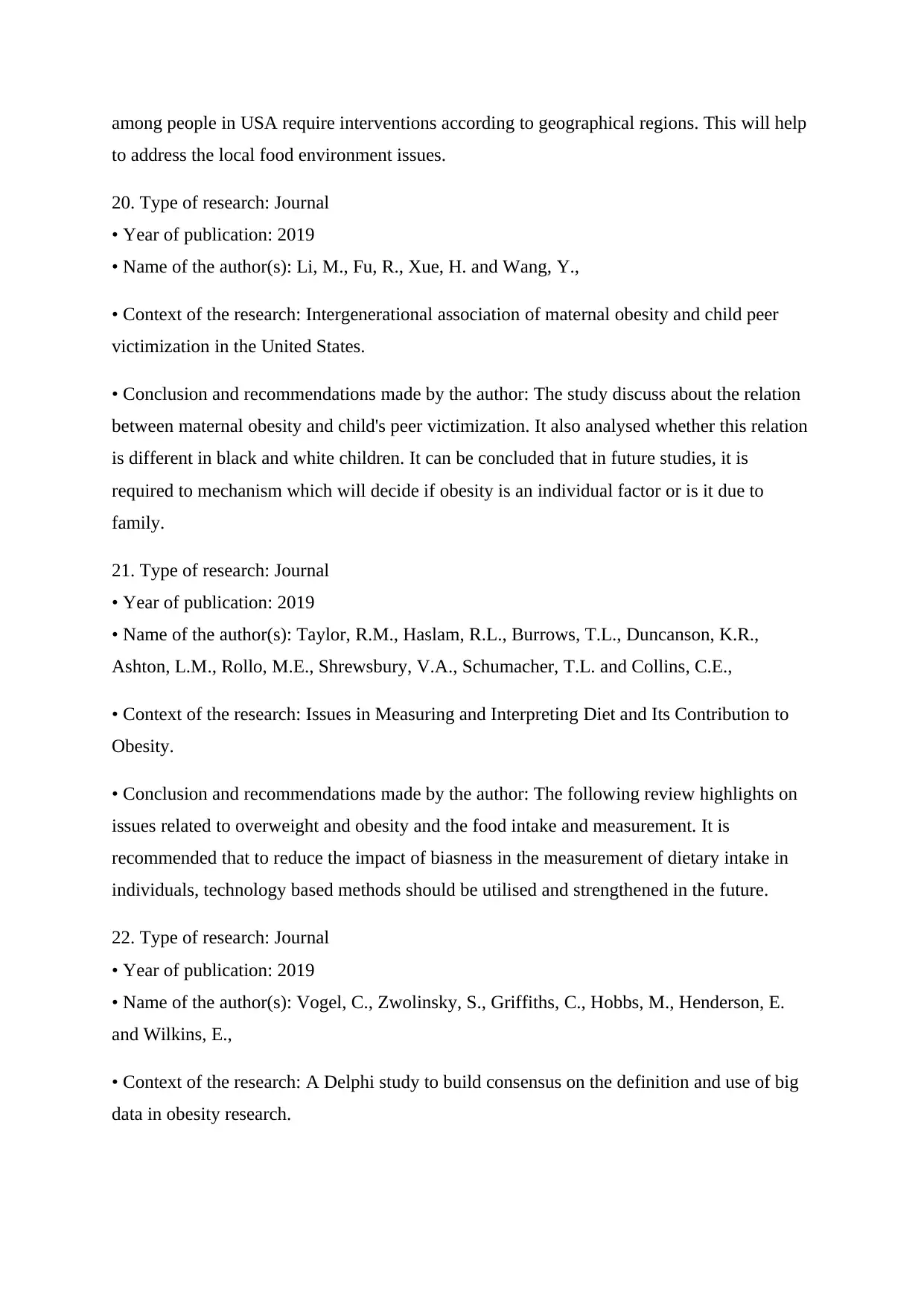
among people in USA require interventions according to geographical regions. This will help
to address the local food environment issues.
20. Type of research: Journal
• Year of publication: 2019
• Name of the author(s): Li, M., Fu, R., Xue, H. and Wang, Y.,
• Context of the research: Intergenerational association of maternal obesity and child peer
victimization in the United States.
• Conclusion and recommendations made by the author: The study discuss about the relation
between maternal obesity and child's peer victimization. It also analysed whether this relation
is different in black and white children. It can be concluded that in future studies, it is
required to mechanism which will decide if obesity is an individual factor or is it due to
family.
21. Type of research: Journal
• Year of publication: 2019
• Name of the author(s): Taylor, R.M., Haslam, R.L., Burrows, T.L., Duncanson, K.R.,
Ashton, L.M., Rollo, M.E., Shrewsbury, V.A., Schumacher, T.L. and Collins, C.E.,
• Context of the research: Issues in Measuring and Interpreting Diet and Its Contribution to
Obesity.
• Conclusion and recommendations made by the author: The following review highlights on
issues related to overweight and obesity and the food intake and measurement. It is
recommended that to reduce the impact of biasness in the measurement of dietary intake in
individuals, technology based methods should be utilised and strengthened in the future.
22. Type of research: Journal
• Year of publication: 2019
• Name of the author(s): Vogel, C., Zwolinsky, S., Griffiths, C., Hobbs, M., Henderson, E.
and Wilkins, E.,
• Context of the research: A Delphi study to build consensus on the definition and use of big
data in obesity research.
to address the local food environment issues.
20. Type of research: Journal
• Year of publication: 2019
• Name of the author(s): Li, M., Fu, R., Xue, H. and Wang, Y.,
• Context of the research: Intergenerational association of maternal obesity and child peer
victimization in the United States.
• Conclusion and recommendations made by the author: The study discuss about the relation
between maternal obesity and child's peer victimization. It also analysed whether this relation
is different in black and white children. It can be concluded that in future studies, it is
required to mechanism which will decide if obesity is an individual factor or is it due to
family.
21. Type of research: Journal
• Year of publication: 2019
• Name of the author(s): Taylor, R.M., Haslam, R.L., Burrows, T.L., Duncanson, K.R.,
Ashton, L.M., Rollo, M.E., Shrewsbury, V.A., Schumacher, T.L. and Collins, C.E.,
• Context of the research: Issues in Measuring and Interpreting Diet and Its Contribution to
Obesity.
• Conclusion and recommendations made by the author: The following review highlights on
issues related to overweight and obesity and the food intake and measurement. It is
recommended that to reduce the impact of biasness in the measurement of dietary intake in
individuals, technology based methods should be utilised and strengthened in the future.
22. Type of research: Journal
• Year of publication: 2019
• Name of the author(s): Vogel, C., Zwolinsky, S., Griffiths, C., Hobbs, M., Henderson, E.
and Wilkins, E.,
• Context of the research: A Delphi study to build consensus on the definition and use of big
data in obesity research.
Paraphrase This Document
Need a fresh take? Get an instant paraphrase of this document with our AI Paraphraser
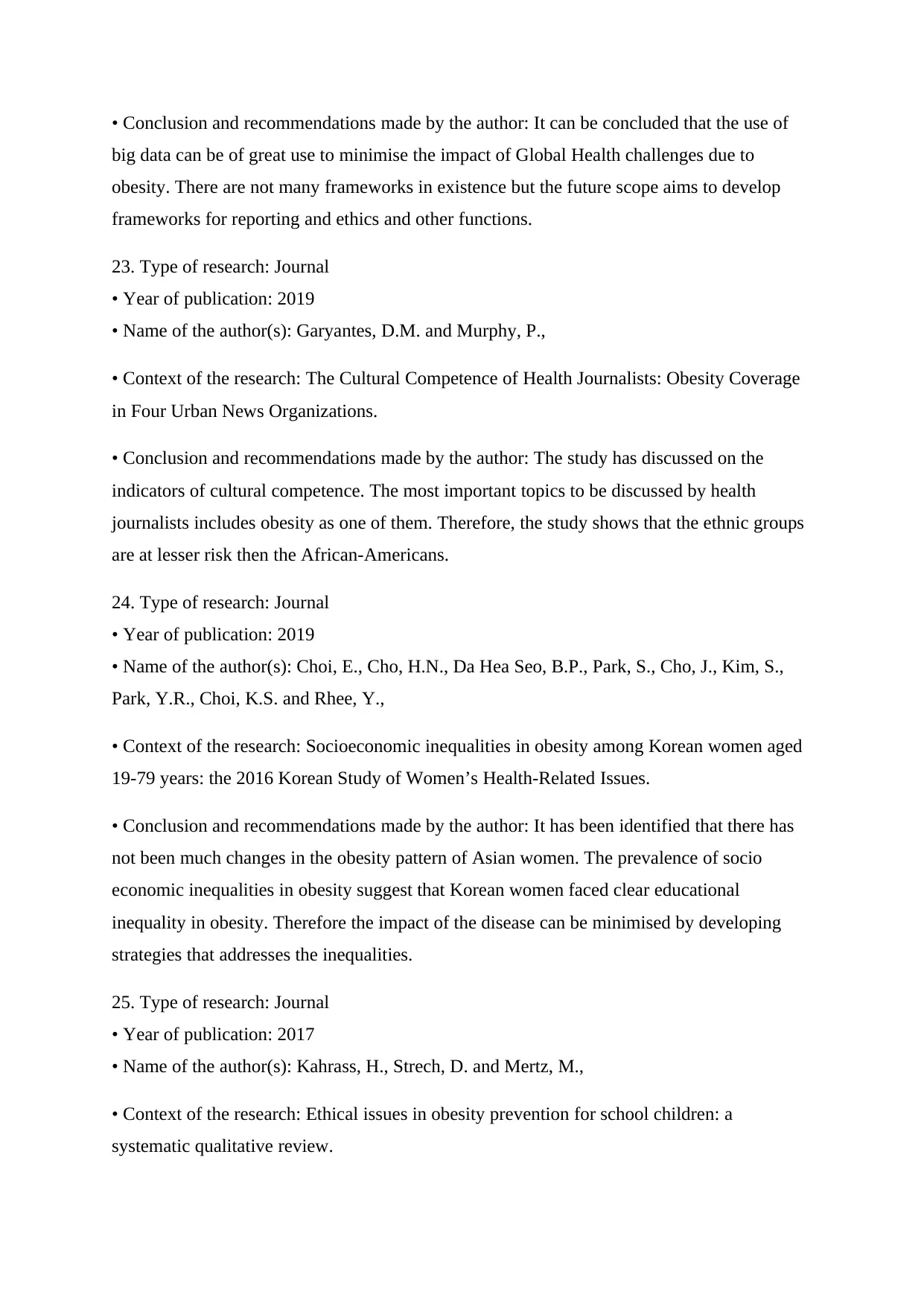
• Conclusion and recommendations made by the author: It can be concluded that the use of
big data can be of great use to minimise the impact of Global Health challenges due to
obesity. There are not many frameworks in existence but the future scope aims to develop
frameworks for reporting and ethics and other functions.
23. Type of research: Journal
• Year of publication: 2019
• Name of the author(s): Garyantes, D.M. and Murphy, P.,
• Context of the research: The Cultural Competence of Health Journalists: Obesity Coverage
in Four Urban News Organizations.
• Conclusion and recommendations made by the author: The study has discussed on the
indicators of cultural competence. The most important topics to be discussed by health
journalists includes obesity as one of them. Therefore, the study shows that the ethnic groups
are at lesser risk then the African-Americans.
24. Type of research: Journal
• Year of publication: 2019
• Name of the author(s): Choi, E., Cho, H.N., Da Hea Seo, B.P., Park, S., Cho, J., Kim, S.,
Park, Y.R., Choi, K.S. and Rhee, Y.,
• Context of the research: Socioeconomic inequalities in obesity among Korean women aged
19-79 years: the 2016 Korean Study of Women’s Health-Related Issues.
• Conclusion and recommendations made by the author: It has been identified that there has
not been much changes in the obesity pattern of Asian women. The prevalence of socio
economic inequalities in obesity suggest that Korean women faced clear educational
inequality in obesity. Therefore the impact of the disease can be minimised by developing
strategies that addresses the inequalities.
25. Type of research: Journal
• Year of publication: 2017
• Name of the author(s): Kahrass, H., Strech, D. and Mertz, M.,
• Context of the research: Ethical issues in obesity prevention for school children: a
systematic qualitative review.
big data can be of great use to minimise the impact of Global Health challenges due to
obesity. There are not many frameworks in existence but the future scope aims to develop
frameworks for reporting and ethics and other functions.
23. Type of research: Journal
• Year of publication: 2019
• Name of the author(s): Garyantes, D.M. and Murphy, P.,
• Context of the research: The Cultural Competence of Health Journalists: Obesity Coverage
in Four Urban News Organizations.
• Conclusion and recommendations made by the author: The study has discussed on the
indicators of cultural competence. The most important topics to be discussed by health
journalists includes obesity as one of them. Therefore, the study shows that the ethnic groups
are at lesser risk then the African-Americans.
24. Type of research: Journal
• Year of publication: 2019
• Name of the author(s): Choi, E., Cho, H.N., Da Hea Seo, B.P., Park, S., Cho, J., Kim, S.,
Park, Y.R., Choi, K.S. and Rhee, Y.,
• Context of the research: Socioeconomic inequalities in obesity among Korean women aged
19-79 years: the 2016 Korean Study of Women’s Health-Related Issues.
• Conclusion and recommendations made by the author: It has been identified that there has
not been much changes in the obesity pattern of Asian women. The prevalence of socio
economic inequalities in obesity suggest that Korean women faced clear educational
inequality in obesity. Therefore the impact of the disease can be minimised by developing
strategies that addresses the inequalities.
25. Type of research: Journal
• Year of publication: 2017
• Name of the author(s): Kahrass, H., Strech, D. and Mertz, M.,
• Context of the research: Ethical issues in obesity prevention for school children: a
systematic qualitative review.
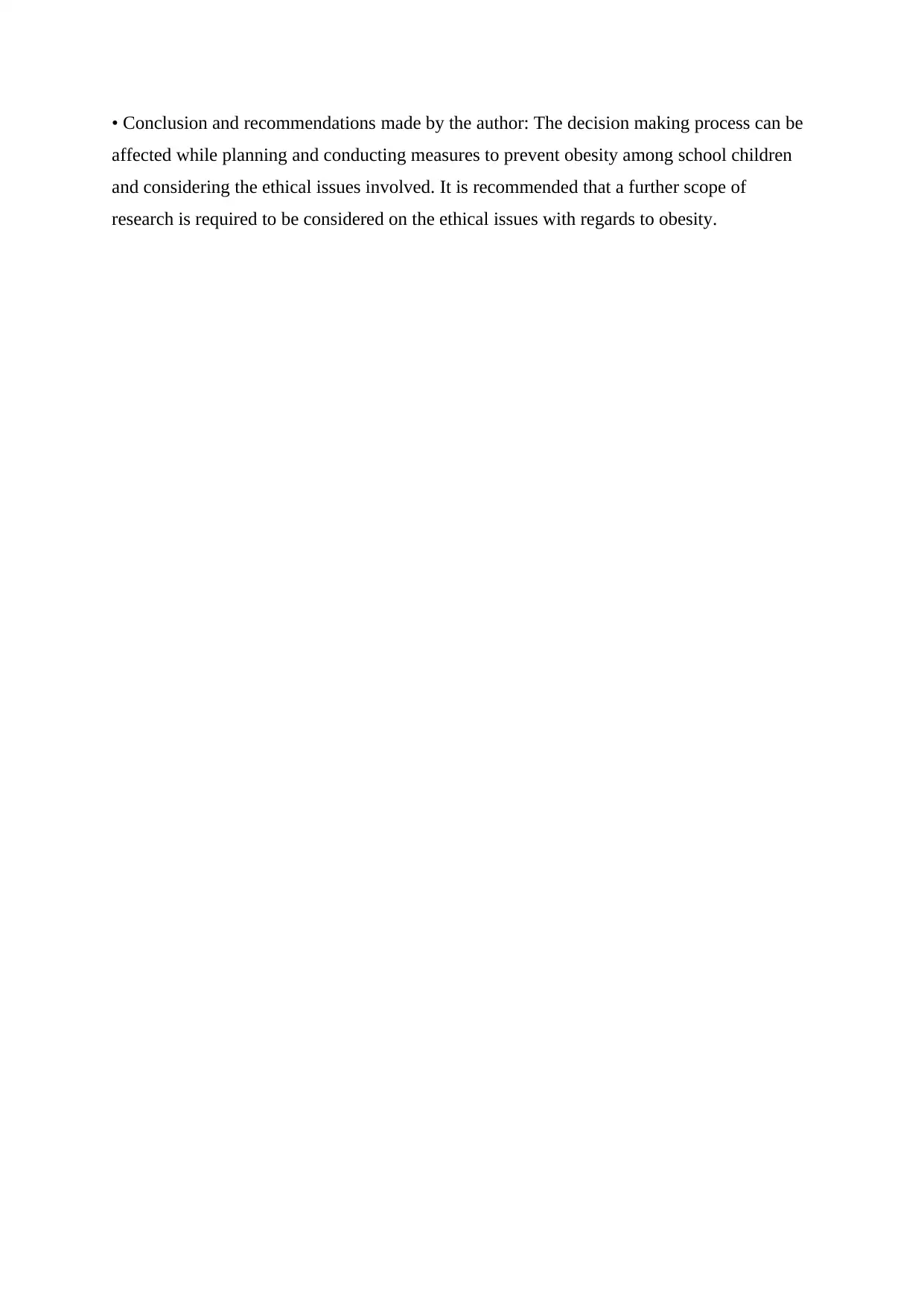
• Conclusion and recommendations made by the author: The decision making process can be
affected while planning and conducting measures to prevent obesity among school children
and considering the ethical issues involved. It is recommended that a further scope of
research is required to be considered on the ethical issues with regards to obesity.
affected while planning and conducting measures to prevent obesity among school children
and considering the ethical issues involved. It is recommended that a further scope of
research is required to be considered on the ethical issues with regards to obesity.
1 out of 9
Related Documents
Your All-in-One AI-Powered Toolkit for Academic Success.
+13062052269
info@desklib.com
Available 24*7 on WhatsApp / Email
![[object Object]](/_next/static/media/star-bottom.7253800d.svg)
Unlock your academic potential
© 2024 | Zucol Services PVT LTD | All rights reserved.





